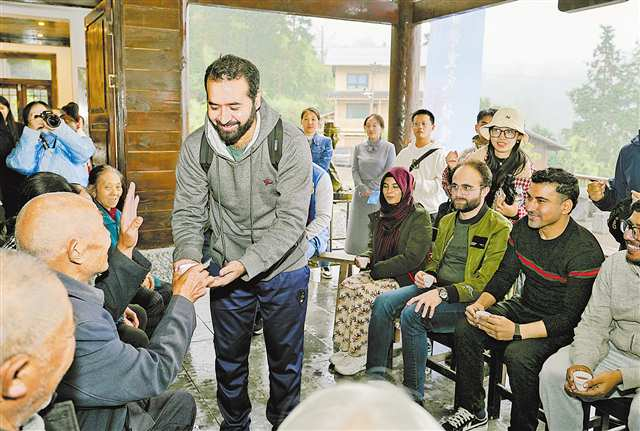International students from 14 countries explore Chinese tea culture
2024-10-15 14:09:10

CHONGQING (CQNEWS) -- The "Study in Chongqing: Understanding the Lunar Calendar" event, aimed at providing Chinese and foreign teenagers with a natural exploration of Nanchuan's countryside, started on October 11 in Chashu Village, Delong Town, Nanchuan District. Students from 14 countries, including Vietnam, Pakistan, Russia, Guinea, Cambodia, and Rwanda, studying at various universities in Chongqing, joined with local students from Jinshanhu Primary School and the Nanchuan Experimental School affiliated with Beijing Normal University. Together, they embarked on a journey to immerse themselves in the tea culture amidst the misty, rain-soaked tea mountains and experience the customs and culture of the Cold Dew season in the Chinese lunar calendar.
“Cold Dew is the seventeenth of the twenty-four traditional Chinese solar terms.” During a themed class on Cold Dew held that day, Liu Yangchi, a teacher from Jinshanhu Primary School, explained to the international students how this season brings subtle changes in nature, rich with cultural significance and traditional customs. Inspired by the discussion, the students eagerly shared their understanding of Cold Dew and other solar terms from the lunar calendar. In a delightful exchange, local students presented the international group with “Golden Buddha Mountain Bamboo Shoot Shell Paintings” they had crafted at school.
“This tea tree is over 2,000 years old, standing 12 meters tall with a crown diameter of about 13 meters.” After the class meeting, the students set off to explore this ancient tea tree, referred to as the "ancestor of tea trees" by Professor Liu Qinjin, the former director of the Tea Research Institute at Southwest University. The group was in awe, quickly pulling out their phones to capture the moment alongside this magnificent tree.
Professor Liu further revealed that over 19,000 ancient tea trees have been identified in Nanchuan District, with more than 17,000 located in Delong Town, primarily in Chashu Village. This rich heritage prompts the village to host an annual ancient tree tea-picking festival, featuring activities like tea picking, production, and cultural research. Visitors can delve into the history and significance of ancient tree tea at the Jiamuyuan Big Tree Tea Museum, gaining a deeper appreciation while savoring its flavors.
Coinciding with the Double Ninth Festival, the event included a lesson in tea offering etiquette at the tea culture auditorium. Several international students prepared warm cups of black tea to present to the village elders, extending their wishes for health and longevity. The group also visited a camellia oil production area, where they learned the traditional methods of extracting oil from the camellia flower under the guidance of local masters.
“This experience has opened my eyes to how Chinese tea is more than just a beverage; it embodies a philosophy of life,” said Li Huangying, a Vietnamese student from Chongqing University of Posts and Telecommunications. “Tea drinking allows one to find calmness and truly savor the flavor, which is a wonderful process.” Claudy, an international student from Rwanda, added, “This experience has been fantastic. I learned about the entire journey of tea, from its growth to its production.” (Translated by Yuki, Fathom Language Limited)
Editor:江夷玮

 手机阅读分享话题
手机阅读分享话题